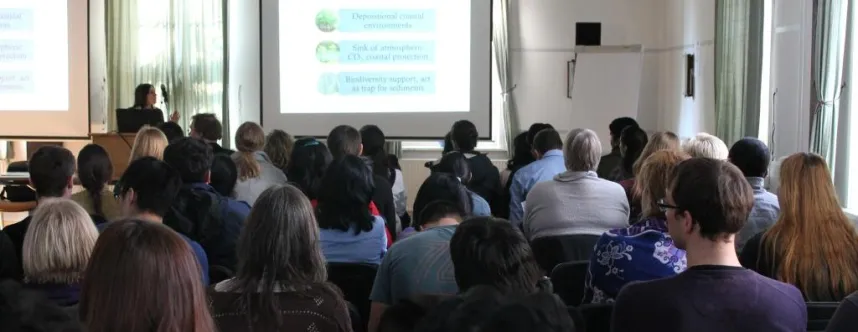MOLIFE RESEARCH SEMINAR: Dr. Heide-Marie Daniel
Talk by:
Dr. Heide-Marie Daniel, Université catholique de LouvainBCCM MUCL, Belgien
Title of the talk:
Yeast diversity in spontaneous food fermentations including cocoa
While a good notion of the occurrence and distribution of microscopic fungi exists, the molecular base of the multiple functions that fungi fulfill in nature is still underexplored. The diversity of their metabolic capabilities makes fungi interesting for various industrial, including biotechnological applications. Among the fungi, yeasts are particularly well-suited for applications because of the ease of handling them, their historical track record of safe use by humans, and the immense knowledge base accumulated for the model yeast Saccharomyces cerevisiae. However, a large diversity of yeast species has evolved in adaptation to various ecological niches. Well-known niches for yeasts are organic substrates containing simple carbohydrates. Ripe fruit such as cocoa pods provide suitable substrates for yeasts and spontaneous fermentation of opened pods is a production step that influences chocolate taste. Economical mass production tends to streamline spontaneous fermentations by high-performance starter cultures and risks to ignore ecological networks supporting spontaneous processes. Although the microbiology of cocoa fermentations has been studied in all major producer countries, questions on the origin and effect of yeast diversity in these fermentations remain to be answered. On which factors depends the dominance of certain species of the genus Hanseniaspora at the onset of the fermentations? Why dominate certain species, most frequently either Saccharomyces cerevisiae or various Pichia species the next phase of the fermentations? Do they influence the product differentially and how? How are the yeasts transmitted to the fermentations? The discovery of the most complete as possible information on a traditionally complex product such as chocolate will help to guard against the loss of yet unknown defining characteristics. The isolation, identification and in particular the preservation and distribution of microorganisms are specialties of culture collections that are the ‘seed banks’ of microbiology. Among the mycological culture collections, BCCM/MUCL shaped its scope towards a high species diversity of environmental fungi with industrial potential.
Further information by: Prof. Dr. Elke Nevoigt, Professor of Molecular Biotechnology, Focus Area: Health - Life Sciences & Chemistry, Email: e.nevoigt@jacobs-university.de, Tel: +49 421 200-3541, Link to Homepage: https://www.jacobs-university.de/ses/molecularbiotech
